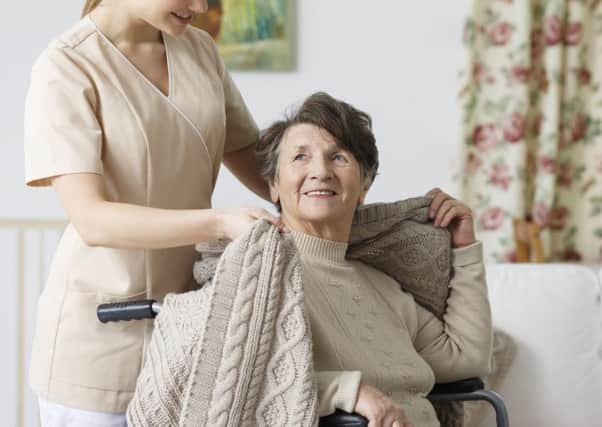Kevan Christie: Skype call no substitute for human contact with elderly


However, turn off this lifeline and the consequences for the older person can be harmful, leaving them feeling isolated and distressed.
For this reason the comments we carry elsewhere today from a health chief, in his response to a damning report into social care services for the elderly in Edinburgh, jarred with me.
Advertisement
Hide AdAdvertisement
Hide AdNo doubt the use of Telecare services has revolutionised the care industry and can be important in delivering a level of care to the elderly through innovations like pill dispensers and easy-to-use computers – that can provide vital information on illnesses like diabetes.
Frankly, I am very uneasy at the use of a Skype equivalent so that a carer can actually see if the patient is taking their medicine when they’re supposed to. And it does nothing for the basic human rights of the elderly.
Floor pads next to beds and alarm systems wired to response teams probably have their place – even if they do scream ‘Panic Room’, with Swat teams coming through the window because Uncle Albert has fallen over.
But Telecare as a replacement for carers? For an actual cup of tea, with a Tunnock’s tea cake and a bit of a blether? Sorry, I’m not having it. Neither it seems are leading charities for the elderly and the patients association, who highlight the loneliness and isolation older people can face if a carer was to suddenly stop coming round - to be replaced by a series of machines.
Having spoken to Rob McCulloch-Graham, the chief officer of the Edinburgh Health and Social Care Partnership, I know he means well. Last month’s care watchdog report was described by the Care Inspectorate as one of the “worst ever” and found that delivery of key processes was ‘unsatisfactory’.
In the understated language of the inspectors ‘weak’ - and there were four of these areas in their report including leadership and direction - and ‘unsatisfactory’ really meant things had hit rock bottom.
McCulloch-Graham and his team now have 17 recommendations to address with a further knock at the door from the inspectors due sometime within the next 18 months.
The difficulties they face are nationwide and not just confined to Edinburgh. A more challenging fiscal climate, increasing numbers of citizens over 75 years of age living with one or more illnesses, and competition for scarce labour from new hotel, leisure, retail and call centre developments threaten the ability of partnerships to recruit and retain care workers.
Advertisement
Hide AdAdvertisement
Hide AdThrow in a lack of funding and the well-documented difficulties of the NHS in Scotland and this sudden reliance on all things technological to provide care looks like a cop out.
The Scottish Government’s 2020 Vision is that by then, everyone will be able to live longer and healthier lives in the comfort of their - specially adapted - own home, with virtual carer making sure you’ve logged on to take your tablets.
Faced with this grim prospect, I imagine a few old folk would prefer sitting in the TV lounge of the local hospital. As a society we can’t get away from the idea of basic human contact and the personal touch - care for the elderly should be at the forefront of this.
A bit of emotional intelligence is what’s required here, with less emphasis on targets and profit.